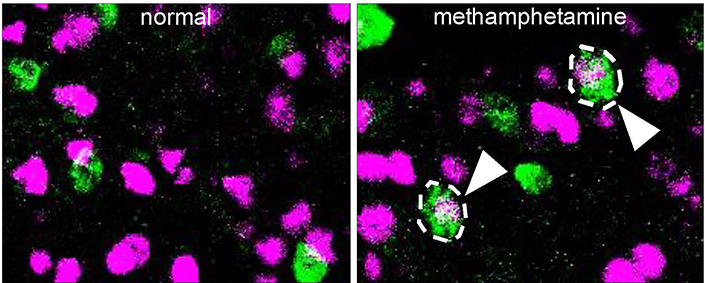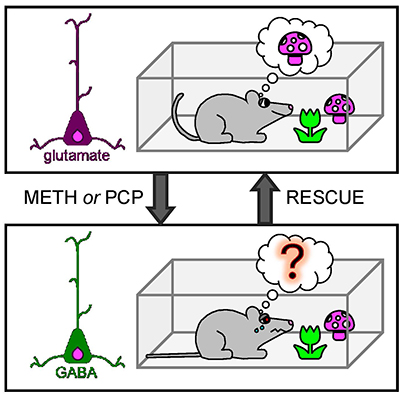Cognitive Deficits from Meth and PCP Use Are Generated By a Common Neurotransmitter Switch
Neurobiologists reversed drug-induced impairments in memory by switching neurotransmitters back to their normal chemical states
Story by:
Published Date
Article Content
The effects of sustained drug abuse can manifest in many ways. Loss of memory and reduced cognitive functions are some of the effects that can persist for years. Neurobiologists at the University of California San Diego have now identified a mechanism in the brain that generates drug-induced cognitive impairments.
Scientists in the Department of Neurobiology, School of Biological Sciences, investigated how methamphetamine and phencyclidine (PCP or “angel dust”), which take effect by activating different targets in the brain, induce a similar reduction in cognitive ability. How could the same difficulties in memory emerge in response to drugs that trigger different actions in the brain?
The results of this investigation, led by Assistant Project Scientist Marta Pratelli in Professor Nicholas Spitzer’s laboratory, are published in Nature Communications. They showed that meth and PCP caused neurons to change the way they communicate through a process known as neurotransmitter switching.

In normal mice (left), magenta neurons express the excitatory transmitter glutamate and green neurons express the inhibitory transmitter GABA. Methamphetamine (right) causes glutamate-expressing neurons to express GABA, demonstrated by neurons co-expressing magenta and green labels (arrowheads) in methamphetamine-treated mice but not in untreated mice (normal).
Neurotransmitter switching is a form of brain plasticity, an evolving area of research investigating how the brain changes function and structure in response to experience. In recent years, Spitzer and his colleagues have also identified roles for neurotransmitter switching in autism spectrum disorder, post-traumatic stress disorder and in exercise.
Examining the cerebral cortex of mice, the investigators found that meth and PCP each caused a switch from the excitatory neurotransmitter glutamate to the inhibitory neurotransmitter GABA (gamma-aminobutyric acid) in the same neurons in the prelimbic region, an area of the frontal cortex involved in executive functions. This switch was linked to a decrease in memory task performance since drug-treated mice performed well in the tasks when the expression of GABA was blocked.

Recognition of objects is a measure of cognition. Having become used to seeing two flowers, the normal mouse (with neurons expressing glutamate) spends more time exploring a new object (a mushroom). After exposure to methamphetamine or PCP (when neurons start expressing GABA), the mouse does not recognize the new object and fails the recognition test. When the change in transmitter is rescued (when neurons are returned to expressing glutamate) the mouse recovers the ability to recognize objects.
Further experiments showed that even after repeated exposure to the drugs, the researchers were able to reverse this neurotransmitter switch using molecular tools to locally decrease the brain’s electrical activity or using clozapine, an antipsychotic drug. Each of these treatments reversed the memory loss, restoring the performance of mice in the cognitive tasks.
“These results suggest that targeted manipulation of neuronal activity may be used to ameliorate some of the negative effects of repeated drug abuse,” said Pratelli.
In this new study, the researchers found that a drug-induced increase in the release of dopamine, a neurotransmitter involved in reward, and an increase in the electrical activity of neurons in the cerebral cortex, were required to produce the neurotransmitter switch.
“This study reveals a shared and reversible mechanism that regulates the appearance of cognitive deficits upon exposure to different drugs,” said Spitzer.
The researchers note in their paper that a deeper understanding of brain mechanisms tied to loss of memory from drug use could boost prospects for new treatments, not only resulting in therapy for meth and PCP consumption, but for other disorders as well.
The researchers included Marta Pratelli, Anna Hakimi, Arth Thaker, Hyeonseok Jang, Hui-quan Li, Swetha Godavarthi, Byung Kook Lim and Nicholas Spitzer. Funding for the study was provided by the National Institute on Drug Abuse (R21 CEBRA grant DA048633; and R21 DA050821) and the Overland Foundation.
Share This:
Stay in the Know
Keep up with all the latest from UC San Diego. Subscribe to the newsletter today.




